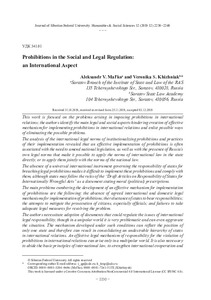Prohibitions in the Social and Legal Regulation: an International Aspect
Скачать файл:
URI (для ссылок/цитирований):
https://elib.sfu-kras.ru/handle/2311/128430Автор:
Mal’ko, Aleksandr V.
Khizhniak, Veronika S.
Малько, А.В.
Хижняк, В.С.
Дата:
2019-12Журнал:
Журнал Сибирского федерального университета. Гуманитарные науки. Journal of Siberian Federal University. Humanities & Social Sciences;2019 12 (12)Аннотация:
This work is focused on the problems arising in imposing prohibitions in international relations; the authors identify the main legal and social aspects hindering creation of effective mechanism for implementing prohibitions in international relations and enlist possible ways of eliminating the possible problems.
The analysis of the international legal norms of institutionalizing prohibitions and practices of their implementation revealed that an effective implementation of prohibitions is often associated with the need to amend national legislation, as well as with the presence of Russia’s own legal norms that make it possible to apply the norms of international law in the state directly, or to apply them jointly with the norms of the national law.
The absence of a universal international instrument governing the responsibility of states for breaching legal prohibitions makes it difficult to implement these prohibitions and comply with them, although states may follow the rules of the “Draft Articles on Responsibility of States for Internationally Wrongful Acts” as a document stating moral (political) prescriptions.
The main problems cumbering the development of an effective mechanism for implementation of prohibitions are the following: the absence of agreed international and domestic legal mechanisms for implementation of prohibitions; the reluctance of states to bear responsibilities; the attempts to mitigate the prosecution of citizens, especially officials; and failures to take adequate legal measures for resolving the problem.
The authors necessitate adoption of documents that could regulate the issues of international legal responsibility, though in a unipolar world it is very problematic and can even aggravate the situation. The mechanism developed under such conditions can reflect the position of only one state and therefore can result in consolidating an undesirable hierarchy of states in international relations. An effective legal mechanism of responsibility for the violation of prohibitions in international relations can arise only in a multipolar world. It is also necessary to abide the basic principles of international law, to strengthen international cooperation and improve the mechanisms of international legal regulation. These efforts also call forth the establishment of a multipolar world В данной работе рассмотрены проблемы, возникающие при реализации запретов в международных отношениях, а также определены основные аспекты правового и социального характера, препятствующие выработке эффективного механизма реализации
запретов в международных отношениях, и сформированы возможные пути их устранения.
Анализ международно-правовых
норм институционализации запретов и практики их использования показал, что эффективное применение запретов часто связано с необходимостью
внесения поправок в национальное законодательство, а также с наличием
внутригосударственных правовых норм, позволяющих непосредственно применять нормы международного права на территории государства или использовать их совместно
с нормами национального права.
Отсутствие универсального международного документа, регулирующего ответственность
государств за нарушение правовых запретов, затрудняет применение этих запретов и их соблюдение, хотя государства могут следовать правилам «Проекта
статей об ответственности государств за международно-противоправные
деяния
» как документа с указанием моральных (политических) норм.
Основные проблемы, препятствующие разработке эффективного механизма реализации запретов, были определены следующим образом: отсутствие согласованных международных
и внутренних правовых механизмов для реализации запретов; нежелание государств нести ответственность; попытки смягчить преследование граждан, особенно должностных
лиц; неспособность принять адекватные правовые меры для решения проблемы.
Авторы заявляют о необходимости принятия документов, которые могли бы регулировать
вопросы международно-правовой
ответственности, хотя в однополярном мире это очень проблематично и может даже усугубить ситуацию. Механизм, разработанный
в таких условиях, может отражать позицию только одного государства
и, следовательно, способен привести к консолидации нежелательной иерархии государств в международных отношениях. Эффективный правовой механизм ответственности
за нарушение запретов в международных отношениях может возникнуть
только в многополярном мире. В свою очередь, необходимо строго соблюдать основные
принципы международного права, укреплять международное сотрудничество и совершенствовать механизмы международно-правового
регулирования. Эти усилия также требуют создания многополярного мира
Коллекции:
Метаданные:
Показать полную информациюСвязанные материалы
Показаны похожие ресурсы по названию, автору или тематике.
-
The Yukos Cases. A Comparative Case Note on the ECtHR’s Decisions and the PCA Tribunal’s Awards
Dederer, Hans-Georg; Дедерер, Ханс-Георг (Сибирский федеральный университет. Siberian Federal University., 2015-10)The decisions on the Yukos cases delivered by the European Court of Human Rights (ECtHR) in 2009/2011/2014 and by an international arbitral tribunal administered by the Permanent Court of Arbitration (PCA Tribunal) in ... -
Commercial bank as cross-border tax intermediaries of the international exchange of information
Трифонова, Юлия Евгеньевна (Сибирский федеральный университет, Красноярск, 2018)The purpose of the research: Investigate the mechanism of international automatic exchange of information in order to determine the role of commercial banks in it and improve its effectiveness. In the collection and analysis ... -
Международное сотрудничество в сфере уголовного судопроизводства (в аспекте соотношения норм международного, европейского и национального права)
Майорова, Л.В.; Majorova, Ludmilla V. (Сибирский федеральный университет. Siberian Federal University., 2011-02)Появление в УПК РФ части пятой («Международное сотрудничество в сфере уголовного судопроизводства») является закономерным, вместе с тем, поскольку ранее этот институт практически не регулировался уголовно-процессуальным ... -
Soft power и smart power в процессе ведения контртеррористических операций
Клачков, П.В.; Klachkov, Pavel V. (Сибирский федеральный университет. Siberian Federal University., 2012-02)The article is devoted to the transformation of the terrorist organizations in present-day conditions and new methods of combating terrorism, successfully proven in areas such as PR, business, sociology and psychology. ... -
The Main Characteristics of the Hague Principles
Kalashyan, Marianna A.; Калашян, Марианна А. (Сибирский федеральный университет. Siberian Federal University., 2016-08)The article considers legal issues of the Hague Principles on the choice of law in international commercial contracts. The experience of approving the Hague Principles is unique in the long-term practice of the Hague ...

